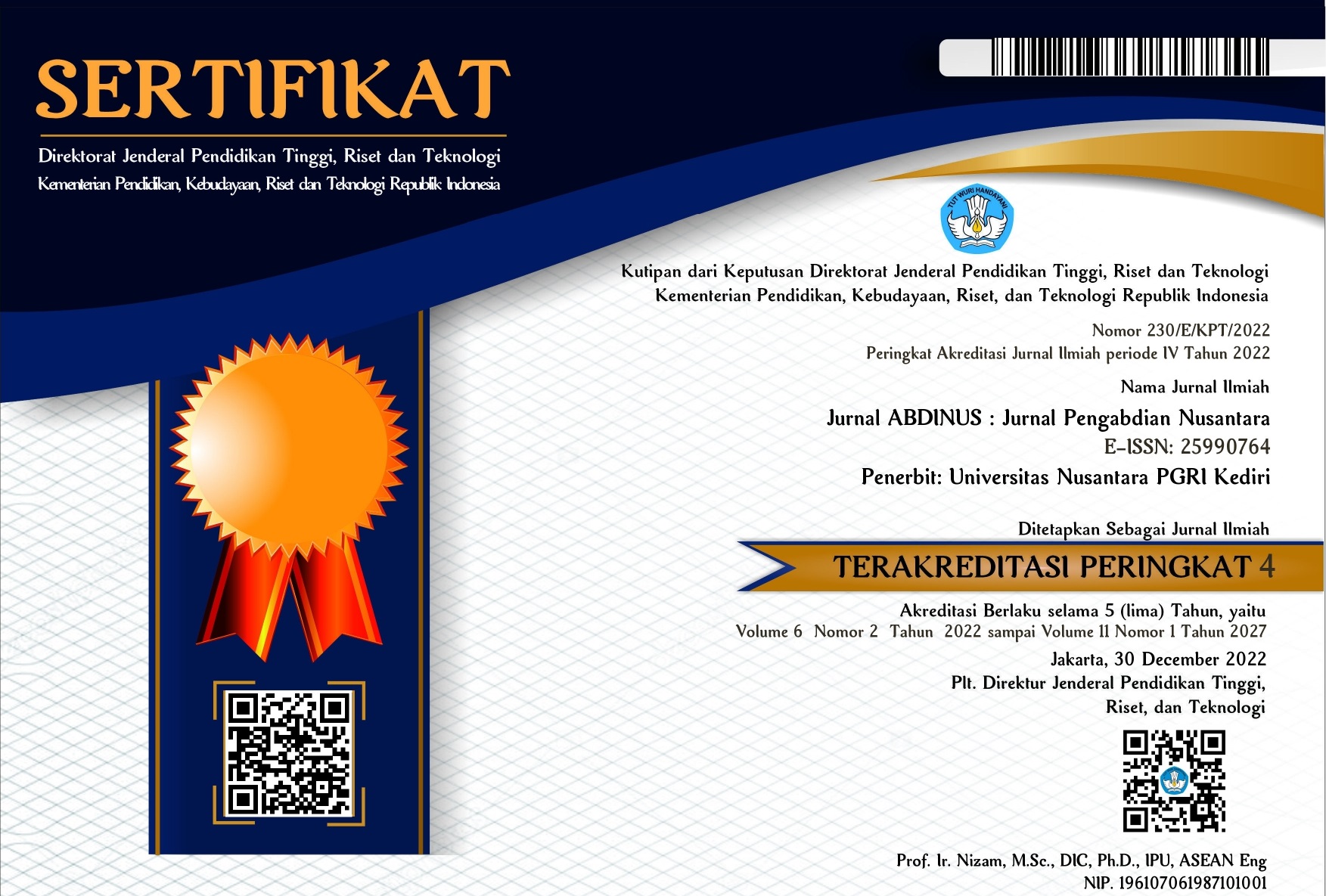Pengembangan Rumah Baca Berorientasi ESD (Education Sustainable Development) untuk Peningkatan Literasi Baca Tulis dan Numerasi bagi Warga Desa Cokro
DOI:
https://doi.org/10.29407/ja.v6i3.17618Keywords:
The Read, ESD (Education Sustainable Development), literacy numeracyAbstract
The Read aimed at solving powerlessness stimulus community in addressing the low literacy house is done by aligning competencies Read community in aspects of education and increase the economy through the realization of future pandemic empowerment of elementary school children. Low reading literacy problems that triggered the latest development and human resource management in reducing Education and economy in the region. Smart Dolanan Community Library as an attempt Poverty and Achieving Sustainable Education in the area to form the character of religiosity, morality and responsibility. Activities to be initiated include the pilot house that optimizes Read local potential associated with the child's multiple intelligence intelligence. The purpose of devotion is to analyze, identify and foster children's understanding of literacy-related knowledge in literacy and numeracy through the Home-based Education Sustainable Development Read to create the next generation in the field calistung berkemajuan. Dedication method used is the Participatory Rural Apraissal Model. Additionally, to provide training for people, especially elementary school children in the village of Clark to build entrepreneurship and improving basic literacy, so as to improve literacy and numeracy literacy villages. This is done to reduce unemployment and improve the education of children in the area. This activity is carried out using a descriptive study using a qualitative approach carried out in the village Cokro. The results showed that the program activities of Education Sustainable Development at Home Read into intensive solution to the demands of the revolutionary educational gap, especially as much as 59.09% learners are women. So, in summary read home-based Education Sustainable Development has a positive impact on the students currently studying at home as well as help facilitate increased self competence and basic literacy and ecological literacy.
Downloads
References
Darwis, R. S., Resnawaty, R., & Nuriyah, E. (2020). Peningkatan Sensitivitas Kepemimpinan Lokal Dalam Pengelolaan Sungai Citarum Melalui Teknik Participatory Rural Appraisal (Pra) Di Desa Rancamanyar. Kumawula: Jurnal Pengabdian Kepada Masyarakat, 3(1), 48. https://doi.org/10.24198/kumawula.v3i1.24820
Hemanda, A. F., Pangarsa, A. A. tata, Fathani, A. H., Saputro, A. N. C., & Kuswantoro, A. (2020). Literasi Disrupsi. In Paper Knowledge . Toward a Media History of Documents.
Iswanto, A., Maknun, Mustolehudin, Masfiah, U., Ridlo, S., & Hidayat. (2017). Praktik Literasi mahasiswa. In Journal of Chemical Information and Modeling (Vol. 8, Nomor 9).
Kelly, L. B., Wakefield, W., Caires-Hurley, J., Kganetso, L. W., Moses, L., & Baca, E. (2021). What Is Culturally Informed Literacy Instruction? A Review of Research in P–5 Contexts. Journal of Literacy Research, 53(1), 75–99. https://doi.org/10.1177/1086296X20986602
Rohmaniyah, I. (2021). Youth, Pandemic, Media, and Religious Contemporary Issues. In Jurnal Lektur Keagamaan (Vol. 3). Suka Press.
Street, B. (2013). Literacy in Theory and Practice: Challenges and Debates Over 50 Years. Theory into Practice, 52(SUPPL 1), 52–62. https://doi.org/10.1080/00405841.2013.795442
Wirawan, P. E. (2021). Model Participatory Appraisal (PRA) Untuk Pemberdayaan Perempuan Berbasis Pendampingan Melalui Pelatihan Cake Decoration di Desa Batuan. Jurnal Abdi Masyarakat, iii.















